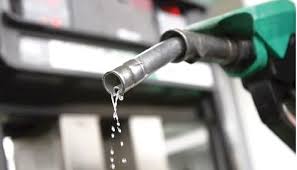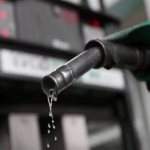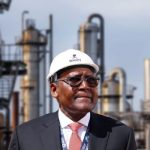The pump prices of Premium Motor Spirit (petrol) may rise further in the coming days as the landing cost of imported PMS has increased again, amid the recent rise in the importation of the commodity.
The surge in imported petrol is coming amid the Dangote refinery’s suspension of the sale of petroleum products in naira to local marketers following the Federal Government’s alleged refusal to continue the naira-for-crude deal.
A scheduled meeting on Monday between the Technical Sub-Committee on the Naira-for-Crude Policy, Dangote refinery, and other government officials did not hold as planned. Insiders familiar with the workings of the committee said the meeting was rescheduled and may be held before the Sallah break.
A source close to the committee revealed that the meeting didn’t hold because the Nigerian Upstream Petroleum Regulatory Commission had yet to present possible options on the naira-for-crude deal, as required by the committee.
Data obtained by the Major Energies Marketers Association of Nigeria on Wednesday indicated that the landing cost of a litre of imported petrol increased by N88 in one week, a development that should reflect on the pump prices of the commodity in the coming days.
But stakeholders under the aegis of MEMAN said those accustomed to price control in the past are resistant to the current changes in the downstream sector, saying price changes are inevitable in a deregulated market.
The landing cost rose from N797 per litre last week, hitting N885 per litre this week. This is an increase of N88 for each litre of petrol imported into the country.
The Major Energies Marketers Association of Nigeria confirmed the rise in the landing cost in its daily energy bulletin released on Wednesday.
The new landing cost is N25 higher than the N860 that end-user customers pay for Dangote petrol from MRS and other partners. Similarly, the Dangote refinery’s ex-depot petrol price is N815 per litre, N70 lower than the new landing cost.
There are indications that this imported petrol may hit N1,000 per litre at filling stations after adding charges and the margins.
In the past few weeks, the pump price of petrol fell to an average of N860 per litre from about N1,000 in January. The Dangote refinery crashed the price multiple times, creating what many described as a trade war in the market.
Fuel importers lost billions of naira as they were made to sell petrol below their costs. During this period, the landing cost fell from about N927 below Dangote’s ex-depot price, forcing the refinery to react with a price cut.
However, with the impasse between the Dangote refinery and the Nigerian National Petroleum Company Limited over the naira-for-crude deal and the rise in the landing cost, there are fears that the price of PMS will rise.
Many have said that the naira-for-crude deal is the only reason the Dangote refinery lowered petrol prices repeatedly.
Experts have suggested that if the 650,000 refinery does not get crude in naira and sell refined products to the local market in naira, it will no longer be able to cut prices. With this, the cost of imported fuel may keep rising, especially due to foreign exchange instability.
While announcing the suspension of naira fuel sales last week, the Dangote Group said, “Dear valued customers, we wish to inform you that the Dangote Petroleum Refinery has temporarily halted the sale of petroleum products in naira. This decision is necessary to avoid a mismatch between our sales proceeds and our crude oil purchase obligations, which are currently denominated in US dollars.
“To date, our sales of petroleum products in naira have exceeded the value of naira-denominated crude we have received. As a result, we must temporarily adjust our sales currency to align with our crude procurement currency.”
Immediately after the announcement, the cost of loading petrol at private depots in Lagos jumped to about N900/litre. It was less than N850/litre before the announcement.
Recently, seven vessels carrying imported Premium Motor Spirit were expected to berth at seaports along the nation’s borders between March 17 and 23.
According to a document obtained from the Nigerian Port Authority, these vessels carrying 115,000 metric tonnes, representing 154.22 million litres of PMS, were to bring in products through three seaports to improve fuel supply nationwide.
An analysis of the document from NPA showed that the commodities landed at the Tincan port in Lagos, the Lekki Deep Seaport in Lagos, and the Calabar port in Cross River State.
The document also revealed that the Dangote refinery imported 654,766 metric tonnes of crude oil within the same period.
Meanwhile, to avoid a return to the days of fuel scarcity, owners of filling stations and many Nigerians appealed to the Federal Government to consider renewing the naira deal with Dangote refinery.
However, depot owners, who are mostly affected by Dangote refinery’s repeated price reduction, told the Federal Government not to renew the naira-for-crude deal, underscoring the effect of the company’s price crashes on its rivals.
The Executive Secretary of the Depot and Petroleum Products Marketers Association of Nigeria, Olufemi Adewole, said, “The naira-for-crude oil transaction framework presents significant risks that could affect Nigeria’s foreign exchange stability and deter foreign direct investment.”
In a statement, Adewole highlighted concerns over the volatility of the naira, emphasizing that crude oil transactions are traditionally carried out in US dollars due to its stability and global acceptability.
While the Federal Government said last year that naira-for-crude transactions could enhance economic sovereignty and strengthen the local currency, Adewole disagreed, emphasizing that policy decisions must prioritize sustainable economic impact.
“DAPPMAN supports all efforts and policies aimed at strengthening the naira. However, these strategies must be capable of driving major economic reforms that address the underlying causes of the naira’s weakness,” he argued.
Following the Dangote refinery’s suspension of the sale of petroleum products in naira, some filling stations started stockpiling PMS.
The retailers are storing the product to ensure they have enough to sell at a higher rate, having projected that the price of petrol would go up soon as a result of the failure of the Federal Government to continue the sale of crude oil to the Dangote refinery in the local currency.
In an interview, the National Publicity Secretary of IPMAN, Chinedu Ukadike, said depot owners were profiteering even as some owners of filling stations were in a rush to stockpile fuel. According to him, the demand for PMS has risen since when Dangote made the announcement.
As a result, depot owners were said to have raised their prices to make more profits. It was observed that players in the downstream petroleum sector have been left to speculate as the Federal Government has kept quiet over the announcement made by the Dangote refinery.
Meanwhile, the Major Energies Marketers Association of Nigeria said those accustomed to price control in the downstream sector are resisting the changes occasioned by deregulation.
MEMAN stated this at its Q1 2025 Press Training & Engagement held in Lagos on Wednesday, bringing together industry experts to provide insights into the evolving energy sector.
According to a communique signed by MEMAN’s Chief Executive Officer, Clement Isong, the association affirmed that the implementation of the Petroleum Industry Act remains firmly on track.
While ongoing debates and discussions are expected, MEMAN said debates should be encouraged as part of the natural evolution of a market-driven energy sector.
It added that the transition from a state-controlled system to a competitive, deregulated market is essential for fostering efficiency, transparency, and long-term economic growth.
“At the event, a petroleum refining expert, Mark Williams, delivered an in-depth presentation on the fundamentals of refining crude oil, the types of refineries, and the key processes involved.”
Similarly, the Vice President, Crude Oil at Argus Media, James Gooder, led a session on gasoline pricing and the benefits of adopting trade and product flows, highlighting how global pricing mechanisms influence Nigeria’s downstream market.
On Tuesday, the Petroleum Products Retail Outlets Owners Association of Nigeria urged the Federal Government not to allow the Dangote refinery to sell petroleum products in dollars to Nigerian marketers.
PETROAN National President, Billy Gillis-Harry, said the announcement created tension among marketers who now panic-buy petrol over fear of possible scarcity or price surge.
According to him, allowing the sale of fuel in dollars will hurt the economy, bringing undue pressure and worsening inflationary pressure.









